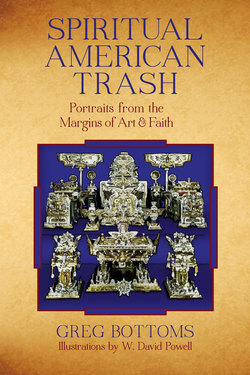Читать книгу Spiritual American Trash - Greg Bottoms - Страница 12
На сайте Литреса книга снята с продажи.
3.
ОглавлениеIn early 1942, everything changed. James was drafted. He knew it was coming as soon as he heard about Pearl Harbor on the night of December 7, 1941, right while he was squeezing the grease out of a pink, sizzling burger. Black man like him, healthy and living in a part of the city white people didn’t even drive through, he knew. But it was okay, too, a part of God’s plan for him. He was a supplicant in the palm of the Father. He was thirty-three now, the same age as Jesus when they nailed him up in sunlight, and he was ready to sacrifice himself if that’s what God wanted.
From 1942 to 1945, James served in the army’s noncombatant 385th Aviation Squadron in Texas, and later in Seattle, Hawaii, Saipan, and Guam. His unit specialized in carpentry and maintenance, and James made (critics speculate) his first piece of The Throne, a small, winged object ornately decorated with foil, in 1945 on the island of Guam. He returned to Washington, DC, in 1946, after receiving a Bronze Star Medal and an honorable discharge. He rented a room in a boardinghouse not far from his brother’s apartment. Then he found work with the General Services Administration as a janitor, not good work, but better than he would have gotten without that Bronze Star Medal and veteran status.
After a brief illness, his brother Lee died suddenly in 1948. Maybe he went to work one day feeling a little down, a bad taste in his mouth and sweat breaking out all over him—he hadn’t been to a doctor in years because who could afford a doctor?—then came home, went to sleep, and never opened his eyes. And maybe they buried Lee down in Elloree (this is how I see it) on a bright, sunny Saturday (funeral day), James reading a stitched-together elegy made of Bible passages over the grave, tears rolling down his face, the whole town gathered around, dressed up black as crows, softly singing hymns. But it was a short visit. After mourning and celebrating the ascendant soul of Lee for a day or two, James got on a train and headed back to Washington, sitting in the rear car, the “black” car, the southern countryside smearing by his window. Lee wasn’t simply James’s brother; he was his best friend, maybe his only friend, and now James, alone but not lonely because he knew all things were a part of His plan, began spending all his time envisioning The Throne. Lee and his janitorial job were his only anchors to this world. Now Lee was gone.
Back in Washington, he went out only to work, find materials for The Throne, and attend a number of different churches in the city (he didn’t believe God would allow for strict denominations and divisiveness concerning His word). By 1949, at the age of forty, he felt the power of God buzzing electrically up his spine. The end-time was coming. He had sensed it during the war, in the stories he heard about what men were capable of doing to one another; he could see it now in the hard faces that hovered along sidewalks, could watch it growing in the people like a malignancy. It was both a curse and a blessing that he sensed it so acutely, felt the world’s decay as a dull ache in his bones.
Some days now the low, gray sky would fill up his skull like cotton and he’d forget everything but God, forget who and where he was, and it was beautiful, this kind of forgetting, but then he’d come to on the street, walking stiff as always, General Services Administration uniform tight and clean around his small frame, and he suddenly had this clarity; he could see despair like a blanket of living, breathing fog over the streets. It was all he could do not to crumble as he headed to work those days, where he cleaned the floors and toilets of the people who ruled the world.
